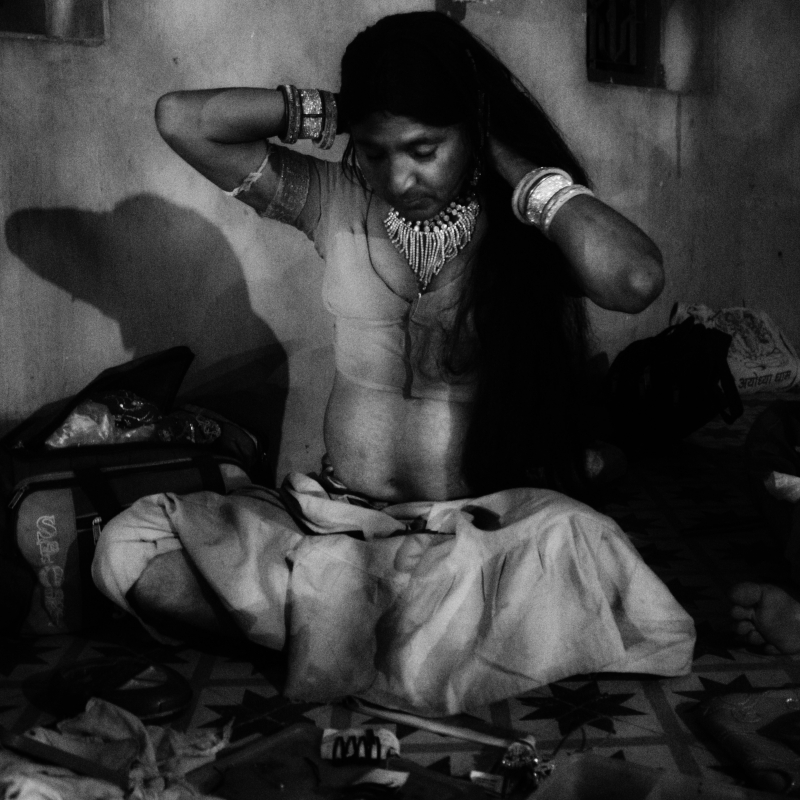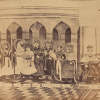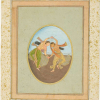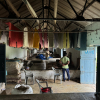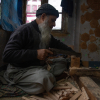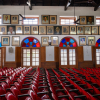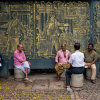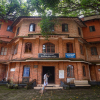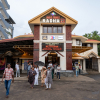Performers are essential to any art form. In Bhavai, they assume even greater significance because of Bhavai’s particular characteristics. Bhavai is not merely a theatre form, it is a social and cultural institution which governs important aspects of its members’ lives. Traditionally, only a person of Bhavaiyya castes (called as Nayak in Mehsana region, Bhojak in Kutch region, and Vyas in Saurashtra) could perform Bhavai. In a society with rigid caste regulations and limited social mobility, Bhavai was the only means of earning livelihood for this community.
During the course of researching Bhavai as an art form, it appeared to this researcher that the personal accounts and general socio-economic history of the performing community deserves documentation as well. This article seeks to explore the Bhavaiyya community’s lifestyle and social history through personal narratives of a few performers.
~
I meet Chhaganbhai* at his home for an interview. He is seated in the living room, apparently ill at ease. He smiles apologetically and tells me, ‘They have redone the entire place since the last time I was here six months ago. I am not used to it just yet. Things keep changing while I am gone.’ Chhaganbhai is the nayak of his Bhavai mandali (troupe), a title commanding great respect and responsibilities. This mandali was founded by his great-grandfather around 150 years ago, and has been active ever since. In the room hangs a frame displaying an antique, disfigured coin. ‘This is the very first earning my ancestors made from performing. The coin is useless now, but we preserve it, for the sake of posterity. Some things we must keep alive,’ he says.
Chhaganbhai finds my request to know more about his life and family history intriguing. ‘We are just a modest family of performers, ben (Gujarati term for ‘sister’). That is all we know, that is all we do. Bhavai is the director of our lives’ stories,’ he says. I reiterate the purpose of the interview; that it is to understand and document the lives and trials of performers of this dying art. He still is not convinced why a performer’s life would be of interest to urban readers, but continues anyway: ‘I was initiated in Bhavai very early, when I was around eight years old. I did not want to go to school, no one in our family had ever been to one! But those were different times, ben. Earlier one could live their entire life without knowing how to read and write. My father really wanted me to study, but my heart was set in learning trade. I have this irrepressible love for acting.’
I ask him about his favourite role, and he answers without hesitation, ‘I most enjoy performing the roles of Sita and other goddesses. I am a professional, ben. I like all my roles alike. But it is the female roles which leave maximum impact on the audience, when they see a man playing a woman’s character with such conviction. But as a lead character, I have to always be at my 100 per cent. If the lead character fails to perform, the whole skit unravels like tepid tea.’
Performing arts is not a highly respected occupation in rural society. Castes recognised as higher do not partake in performing dance and theatre in public. There is also stigma associated with wandering tribes, which are looked at with suspicion and derision. Bhavai suffers from both. Chhaganbhai says, ‘My grandfather used to tell us how the touring mandali was made to sit outside the Patidar’s house and served food in aluminium utensils. We are also Brahmins ben, we should not be treated this way. But one has to do things to feed the family.’
~
Rajibhai* and I find time to talk in between performances. He has to be on his feet tonight as he has a bit role to play in all the skits. He takes a deep puff of his beedi before he starts speaking, ‘This lifestyle? It’s not the worst. I know some young men from village who have taken to alcohol, drugs. They are intoxicated all the time. People take their name as if they are talking about a disease. Compared to them, I am doing great. People even come and touch my feet when I play Hanuman and other gods.’
But what about his children? What do they think of his profession? Rajibhai turns sombre, ‘I sent them to Rajkot to study. The village school headmaster told us about some scholarship scheme for backward caste children, so I have been able to provide them with higher education. I wanted them to go to college, speak English. They are too modern for me now. They are not proud of what I do. They never say anything, but I know. They have never brought any of their friends from city to our home. May be they are ashamed of the fact that their father dresses and acts like a woman.’
Considering the hereditary nature of Bhavai, Rajibhai is pessimistic about the future of this art form. None of his three children is trained in any performance-related skill, ‘They have not even watched a Bhavai performance in years,’ adds Rajibhai. ‘Bhavai is too crass for this new generation, ben. They think it is too loud, too simplistic. They like fancy shows, in theatres and cinema halls. If I cannot even get my children to watch a show, how will I ever convince them to continue the ancestral profession?’ Rajibhai laments, ‘This (Bhavai) is really all I have to bequeath to them.’
Rajibhai will be the last in his family to perform Bhavai. Like him, there are many other performers who stand at the ledge of history. It is a tough truth to accept. Bhavai performers take immense pride in their legacy and its exclusivity. To see its end imminent in upcoming decades is disheartening for many of them. There are numerous reasons why Bhavai has lost favour with audiences and patrons. An ironic reason is the current crop of performers’ self-professed discouragement to their future generations to take up Bhavai. Rajibhai explains, ‘There is no money or prestige in Bhavai anymore. We toil night after night, moving from one village to another, away from family and home; and yet we cannot make enough money to meet today’s monghwari (expenses). May be our ancestors were respected and welcomed for what they used to do. It doesn’t happen anymore. No one wants their children to work hard for no money or respect.’
~
‘Bhavai has been dying for centuries now, ben. You don’t need to worry about it. It always finds a way to live on.’ 70-year old Jasubhai* is a bundle of optimism and spirit. He has dedicated six decades of his life performing various trades in Bhavai. ‘I was an all-rounder, ben. What all I did not do! I have prepared tea, stitched up costumes, been the make-up man, done all sorts of roles, written and directed plays, been the mandali leader—I have done it all,’ he says. Jasubhai developed arthritis recently, and has since limited his involvement to playing musical instruments in the Bhavai orchestra.
Jasubhai has been active with his mandali since before the time of televisions, telephones, and ‘motor cars’, as he calls them. ‘It was not easy back then, staying away from months at a go. We had no means to talk to anyone back at home. If there really was urgent news, the best we could do was to send a telegram, if we happened to pass by a town. It was even more difficult to receive news from home, because we were always on the go. Someone from the mandali would continuously travel back and forth from our village to carry news and transport items. I received the news of my mother falling ill and immediately set out for home. But I could not be there in time to see her alive,’ he says.
Jasubhai is quick to change the mood of the conversation. In his career spanning six decades, he has performed extensively outside of the Gujarati-speaking region. He proudly rattles off the names of Indian and foreign cities he has been to: ‘Those were the glory days, ben. We used to be invited from far-off places to perform. Bhavai translates well into Hindi and Marwari, ben. The audiences used to sit glued to their seats for hours and watch us. It’s not the same now anymore.’
Electronic devices, social media, and changing social values have changed the landscape of popular entertainment. Folk theatre has experienced declining popularity in rural centres, where inexpensive smartphones and Jio mobile connections have opened new avenues of entertainment for rural populace. Bhavai has experienced a steady decline as well, for additional reasons such as outdated themes, purported vulgarity, and an inflexible hereditary structure. Does Jasubhai see Bhavai getting extinct in near future, I ask. ‘Someone or the other has always been predicting Bhavai’s demise. They say, ‘Your humour is vulgar, your actors are loud, you are beggars, no one watches a live show anymore.’ But they have been saying these things since I was a child! First it was radio, then TV, now internet. But Bhavai always manages to stay connected with the audiences. It just evolves,’ he says.
The reluctance in the children of most current performers to take up Bhavai professionally is a serious concern. Efforts are being made by the state government to encourage new actors to learn Bhavai. A training centre in Visnagar (Mehsana district) is dedicated to training and innovation in Bhavai. Jasubhai says, ‘The true mandate to perform Bhavai lies with the Bhavaiyya samaj, ben. There have always been some people from other communities who say they do Bhavai, but it is not the same. They do it for money. A Bhavaiyya performs because he has mataji no ashirwad (blessings of the goddess) to spread the divine message.’ How does he feel about women and professional actors performing Bhavai? ‘It is not the best thing to do, but may be the right thing at this time. The kala (art) must not go extinct. So if this is the way it can be kept alive, then so be it.’
~
Sukhiben* appears nervous. She has never been interviewed before. Her husband Chhaganbhai manages a prominent mandali, so she has seen people often coming to their home for conducting interviews and clicking photographs. Women do not participate in Bhavai in any capacity. Yet their role in the community cannot be overlooked. Since the family’s men are gone away for long stretches almost throughout the year, the lion’s share of running the household and raising the family falls on the women’s shoulders.
How does she feel about not having her husband around so often? ‘I don’t think anything about it most of the time, ben. I had never given this much of a thought. I grew up used to it. My father used to perform too, so he was also mostly away. I have grown up knowing this to be normal.’ But normal is not the same as easy, as she quickly adds, ‘There are some times when I realise his absence. Over here in the village, some things can be done by men only. Like this time when I had to get my youngest son’s name added to our Below Poverty Line card. I had never been to the district before. After lot of hassle I finally reached the office. I did not see a single woman there, ben. Just men. I felt very awkward while waiting for my turn in that crowd. Had my husband been around, I would not have had to face that situation,.’
Sukhiben’s husband practices a common yet unique profession. Performing dance and drama for one’s livelihood is fairly common, but it is men espousing female roles which makes it unique. While exceptions are found in performances in urban centres, rural Bhavai only allows male performers. How does Sukhiben feel about her husband and father playing women’s roles in front of public? ‘It is acting, ben. Actors have to do all kinds of things. Even film actors do different roles on screen. I do not think any differently of it. Sometimes they play a dacoit or a swindler, that does not mean they become a dacoit or a swindler.’
Until recent times, the community’s women were expected to adhere to strict gender roles. That included not going out after dusk, not even to watch their own family men perform. Sukhiben says, “’t was for our own good, ben. That is why Asait Thakar decided that women should not perform Bhavai. If we dance and act coyly for everyone to see, other men may look at us with lust. When men do these things, such things do not happen. It is with the ashirwad of Bahuchra mata, that our men are able to act like women, and yet not become feminine.’
Every Bhavai performance begins with an arti and invocations to the goddess sisters Bahuchra and Amba. The belief goes that as presiding deity of Bhavai, Bahuchra renders the performers devoid of their masculinity during the night of Bhavai, which is bestowed back upon them after the performance is complete. ‘That is why you never see a feminine Bhavaiyya man, ben. My father did it for fifty years but never once walked with a latka. That is why only Bhavaiyya men are fit for doing Bhavai,’ Sukhiben says.
Like other rural women, Bhavaiyya women are also finding new opportunities to study and work. Sukhiben’s daughter goes to Rajkot to study in a women’s college where she is pursuing a business management degree. Sukhiben and I sit and chat for a while as we enjoy kadak (strong) Saurashtra tea. She has become more relaxed around me. She quips, ‘You asked me how I feel about my husband doing women’s roles. I like it. I get to have new saris because of that.'
(The views expressed in this article are by no means representative. Names have been changed upon request to protect the identity of respondents.)
